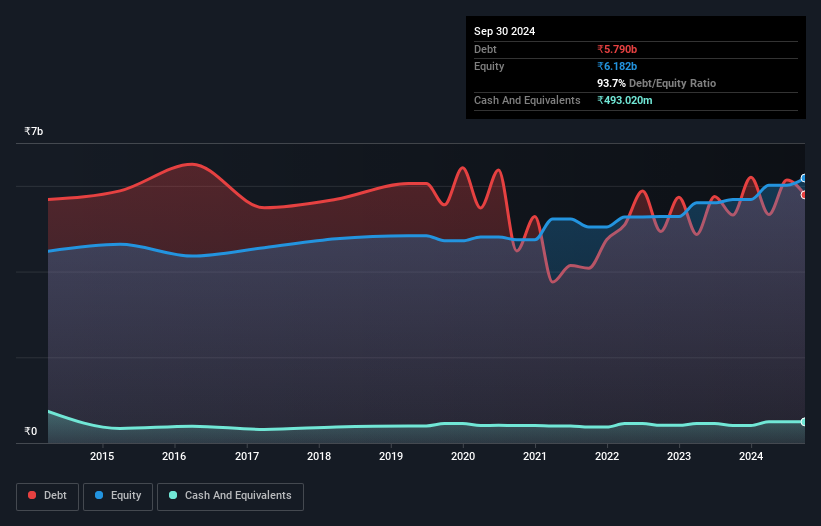- India
- /
- Specialty Stores
- /
- NSEI:TBZ
We Think Tribhovandas Bhimji Zaveri (NSE:TBZ) Is Taking Some Risk With Its Debt
The external fund manager backed by Berkshire Hathaway's Charlie Munger, Li Lu, makes no bones about it when he says 'The biggest investment risk is not the volatility of prices, but whether you will suffer a permanent loss of capital.' So it might be obvious that you need to consider debt, when you think about how risky any given stock is, because too much debt can sink a company. As with many other companies Tribhovandas Bhimji Zaveri Limited (NSE:TBZ) makes use of debt. But the more important question is: how much risk is that debt creating?
Why Does Debt Bring Risk?
Generally speaking, debt only becomes a real problem when a company can't easily pay it off, either by raising capital or with its own cash flow. If things get really bad, the lenders can take control of the business. However, a more common (but still painful) scenario is that it has to raise new equity capital at a low price, thus permanently diluting shareholders. Having said that, the most common situation is where a company manages its debt reasonably well - and to its own advantage. When we think about a company's use of debt, we first look at cash and debt together.
See our latest analysis for Tribhovandas Bhimji Zaveri
What Is Tribhovandas Bhimji Zaveri's Debt?
The image below, which you can click on for greater detail, shows that at September 2024 Tribhovandas Bhimji Zaveri had debt of ₹5.79b, up from ₹5.32b in one year. On the flip side, it has ₹493.0m in cash leading to net debt of about ₹5.30b.

A Look At Tribhovandas Bhimji Zaveri's Liabilities
According to the last reported balance sheet, Tribhovandas Bhimji Zaveri had liabilities of ₹10.1b due within 12 months, and liabilities of ₹852.6m due beyond 12 months. Offsetting this, it had ₹493.0m in cash and ₹24.6m in receivables that were due within 12 months. So it has liabilities totalling ₹10.5b more than its cash and near-term receivables, combined.
This deficit isn't so bad because Tribhovandas Bhimji Zaveri is worth ₹17.8b, and thus could probably raise enough capital to shore up its balance sheet, if the need arose. But it's clear that we should definitely closely examine whether it can manage its debt without dilution.
We measure a company's debt load relative to its earnings power by looking at its net debt divided by its earnings before interest, tax, depreciation, and amortization (EBITDA) and by calculating how easily its earnings before interest and tax (EBIT) cover its interest expense (interest cover). This way, we consider both the absolute quantum of the debt, as well as the interest rates paid on it.
Tribhovandas Bhimji Zaveri has a debt to EBITDA ratio of 3.9 and its EBIT covered its interest expense 2.9 times. This suggests that while the debt levels are significant, we'd stop short of calling them problematic. However, one redeeming factor is that Tribhovandas Bhimji Zaveri grew its EBIT at 15% over the last 12 months, boosting its ability to handle its debt. There's no doubt that we learn most about debt from the balance sheet. But it is Tribhovandas Bhimji Zaveri's earnings that will influence how the balance sheet holds up in the future. So when considering debt, it's definitely worth looking at the earnings trend. Click here for an interactive snapshot.
Finally, a business needs free cash flow to pay off debt; accounting profits just don't cut it. So it's worth checking how much of that EBIT is backed by free cash flow. In the last three years, Tribhovandas Bhimji Zaveri created free cash flow amounting to 13% of its EBIT, an uninspiring performance. That limp level of cash conversion undermines its ability to manage and pay down debt.
Our View
While Tribhovandas Bhimji Zaveri's conversion of EBIT to free cash flow makes us cautious about it, its track record of covering its interest expense with its EBIT is no better. At least its EBIT growth rate gives us reason to be optimistic. Taking the abovementioned factors together we do think Tribhovandas Bhimji Zaveri's debt poses some risks to the business. So while that leverage does boost returns on equity, we wouldn't really want to see it increase from here. There's no doubt that we learn most about debt from the balance sheet. However, not all investment risk resides within the balance sheet - far from it. We've identified 3 warning signs with Tribhovandas Bhimji Zaveri (at least 2 which can't be ignored) , and understanding them should be part of your investment process.
When all is said and done, sometimes its easier to focus on companies that don't even need debt. Readers can access a list of growth stocks with zero net debt 100% free, right now.
Valuation is complex, but we're here to simplify it.
Discover if Tribhovandas Bhimji Zaveri might be undervalued or overvalued with our detailed analysis, featuring fair value estimates, potential risks, dividends, insider trades, and its financial condition.
Access Free AnalysisHave feedback on this article? Concerned about the content? Get in touch with us directly. Alternatively, email editorial-team (at) simplywallst.com.
This article by Simply Wall St is general in nature. We provide commentary based on historical data and analyst forecasts only using an unbiased methodology and our articles are not intended to be financial advice. It does not constitute a recommendation to buy or sell any stock, and does not take account of your objectives, or your financial situation. We aim to bring you long-term focused analysis driven by fundamental data. Note that our analysis may not factor in the latest price-sensitive company announcements or qualitative material. Simply Wall St has no position in any stocks mentioned.
About NSEI:TBZ
Tribhovandas Bhimji Zaveri
Designs, manufactures, retails, and sells jewelry primarily in India.
Proven track record with mediocre balance sheet.
Similar Companies
Market Insights
Community Narratives



